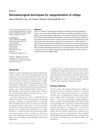71 citations,
May 2006 in “The journal of investigative dermatology/Journal of investigative dermatology” TTD hair brittleness is caused by multiple structural abnormalities.
 65 citations,
February 2015 in “Neuro-Oncology”
65 citations,
February 2015 in “Neuro-Oncology” Alisertib was found to be an effective and tolerable treatment for children with recurrent brain tumors.
63 citations,
February 2017 in “ACS biomaterials science & engineering” Polydopamine is a safe, effective, and permanent hair dye that turns gray hair black in one hour.
 61 citations,
May 2014 in “International journal of pharmaceutics”
61 citations,
May 2014 in “International journal of pharmaceutics” Nanocrystals improve skin penetration and stability of caffeine, suggesting a new method for delivering similar substances through the skin.
 61 citations,
April 2012 in “British Journal of Dermatology”
61 citations,
April 2012 in “British Journal of Dermatology” Caucasian women's hair appears thickest in their 20s, with perceived thinning after mid-30s due to both decreasing density and diameter.
 60 citations,
April 2006 in “International Journal of Dermatology”
60 citations,
April 2006 in “International Journal of Dermatology” Surgical methods like suction blister grafting and split-thickness skin grafting are highly successful for vitiligo repigmentation, but choosing the right patients is crucial for success.
52 citations,
February 2003 in “Archives of dermatology” 9-cis-retinoic acid showed some effectiveness in treating AIDS-related Kaposi sarcoma but had significant side effects at higher doses.
 51 citations,
May 2010 in “Journal of Drug Targeting”
51 citations,
May 2010 in “Journal of Drug Targeting” Transcutol-containing vesicles improve minoxidil's skin penetration and hair growth promotion.
 50 citations,
May 1999 in “Journal of Reconstructive Microsurgery”
50 citations,
May 1999 in “Journal of Reconstructive Microsurgery” Microsurgical reconstruction effectively covers complex scalp defects but doesn't improve survival for cancer-related cases.
 49 citations,
March 2017 in “Journal of the American Academy of Dermatology”
49 citations,
March 2017 in “Journal of the American Academy of Dermatology” Tofacitinib caused significant hair regrowth in adolescents with alopecia universalis who didn't respond to other treatments.
 47 citations,
July 2014 in “European Journal of Pharmaceutics and Biopharmaceutics”
47 citations,
July 2014 in “European Journal of Pharmaceutics and Biopharmaceutics” Scientists created a gel with nanoparticles to deliver medicine to hair follicles effectively.
47 citations,
September 2011 in “Acta biomaterialia” Protein composition greatly affects the function of keratin biomaterials.
 45 citations,
January 1999 in “Dermatology”
45 citations,
January 1999 in “Dermatology” The VQ-Dermato is a reliable French questionnaire for measuring quality of life in chronic skin disorder patients.
 44 citations,
August 2017 in “Food Bioscience”
44 citations,
August 2017 in “Food Bioscience” Researchers made a special butter with added betasitosterol that could be healthier for the heart and stayed good for three months.
 44 citations,
July 2004 in “Archives of Dermatology”
44 citations,
July 2004 in “Archives of Dermatology” Finasteride for hair loss has minimal impact on sexual function.
40 citations,
August 2021 in “JAAD international” Teledermatology became a valuable and convenient tool for skin care during the COVID-19 pandemic.
38 citations,
March 1997 in “Journal of interferon & cytokine research” IL-1β inhibits human hair follicle growth.
 37 citations,
January 2019 in “Dermatologic Therapy”
37 citations,
January 2019 in “Dermatologic Therapy” A dietary supplement with Boswellia serrata, Curcuma longa, and Vitis vinifera showed potential improvement in hair health for telogen effluvium patients, but more research is needed.
37 citations,
February 2015 in “Journal of the European Academy of Dermatology and Venereology” Oral isotretinoin is the most effective treatment for folliculitis decalvans.
36 citations,
January 2010 in “International Journal of Trichology” Intralesional steroids can help regrow hair in some alopecia areata patients but have side effects.
35 citations,
October 2005 in “European journal of pharmaceutics and biopharmaceutics” Polymers increased skin permeation and stability of steroid hormones in liposomal formulations.
 33 citations,
January 2018 in “The International Journal of Developmental Biology”
33 citations,
January 2018 in “The International Journal of Developmental Biology” Cell aging can be both good and bad for tissue repair.
31 citations,
January 2012 in “European journal of pharmaceutics and biopharmaceutics” PLA particles release their contents differently based on the type of fluorochrome used.
 29 citations,
July 2010 in “Journal of Cutaneous Medicine and Surgery”
29 citations,
July 2010 in “Journal of Cutaneous Medicine and Surgery” Treatments for Frontal Fibrosing Alopecia have not been proven effective.
28 citations,
July 2015 in “Dermatologic therapy” The combined therapy was effective and safe for children with severe alopecia areata.
28 citations,
September 2014 in “Journal of Veterinary Internal Medicine” VDC-1101 shows potential as a treatment for canine cutaneous T-cell lymphoma.
 28 citations,
March 2014 in “International Journal of Nanomedicine”
28 citations,
March 2014 in “International Journal of Nanomedicine” New lipid nanoparticles show promise for delivering hair loss treatments but need improvement for better skin penetration.
 26 citations,
September 2018 in “Colloids and Surfaces B: Biointerfaces”
26 citations,
September 2018 in “Colloids and Surfaces B: Biointerfaces” A new liposome treatment helps heal deep burns on mice by improving hair regrowth and reducing scarring.
 26 citations,
March 2013 in “Journal of Biomedical Materials Research Part A”
26 citations,
March 2013 in “Journal of Biomedical Materials Research Part A” Researchers created a 3D hydrogel that mimics human hair follicles, which may help with hair loss treatments.
26 citations,
January 2005 in “PubMed” RUM-loaded SLN shows promise for treating acne and hair loss topically.
















